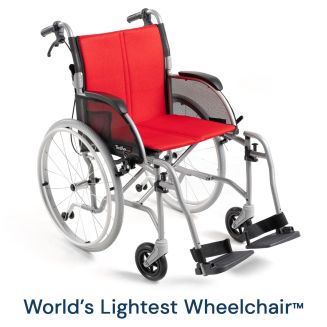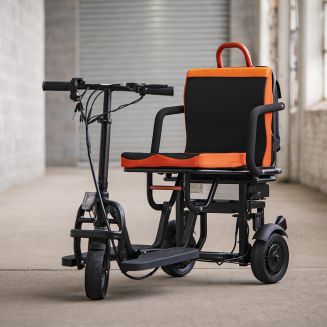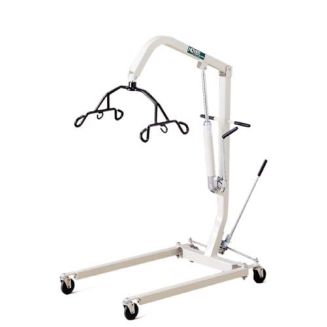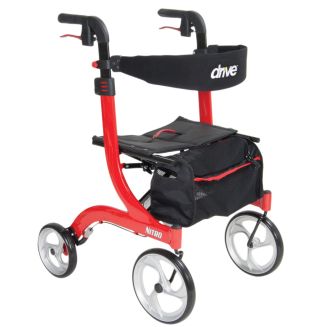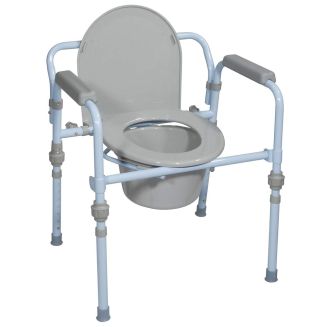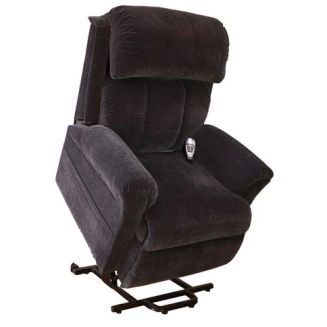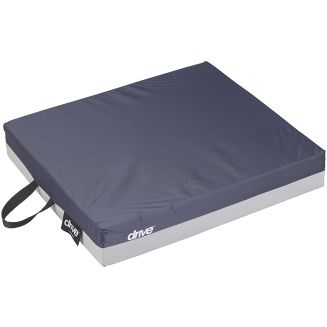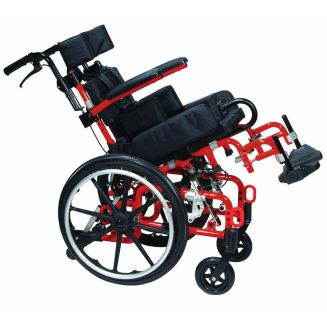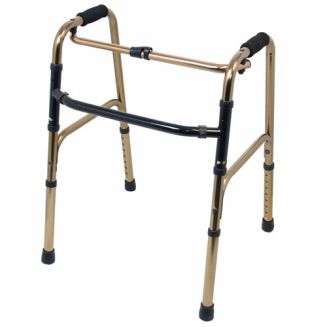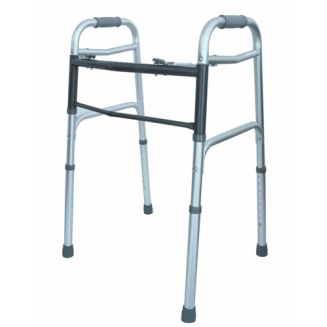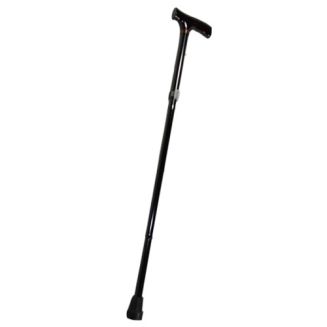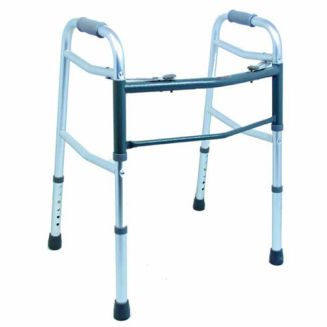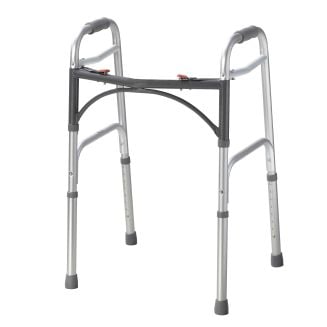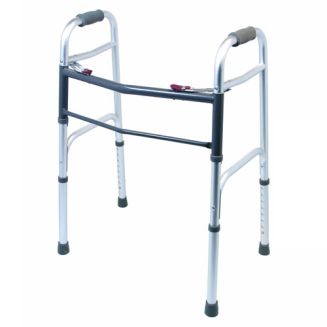Standard Walkers
A standard walker is a walking aid characterized by its use of platforms at the bottom of each leg, rather than wheels. While wheels reduce friction and make movement easier, standard walkers tend to provide greater support and stability. If you’re struggling to make a decision, try both styles and see what feels most natural. If lifting and maneuvering your standard walker is a struggle, you may want to opt for a wheeled variant, but if maintaining posture and balance is difficult with a wheeled walker, you may want to opt for a standard model.
At 1800wheelchair, we carry a wide selection of affordable standard walkers and can accommodate users of all sizes. We also have an extensive walker accessories section, where you’ll find a variety of customization options to help ensure that any walking aid you buy is a perfect fit.
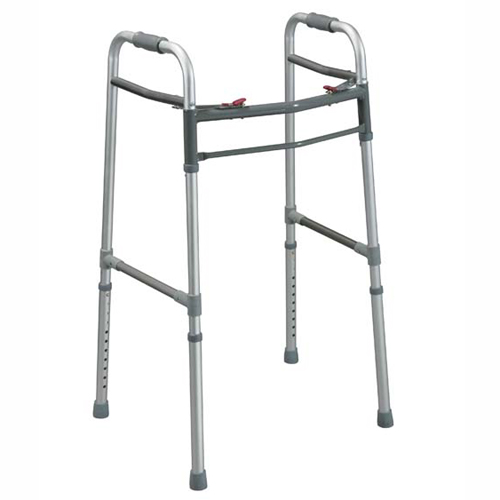
-
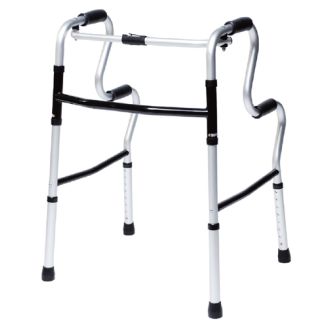 UpRise Onyx Folding Walker2 Reviews
UpRise Onyx Folding Walker2 Reviews- Single release folding mechanism is designed to aid users with limited hand dexterity
- Combination of folding walker and rising aid all in one
- Secondary handles provide stable assistance from a seated to a standing position
Weight Capacity 400 lbs. Min. Handle Height 32" Max. Handle Height 39" -
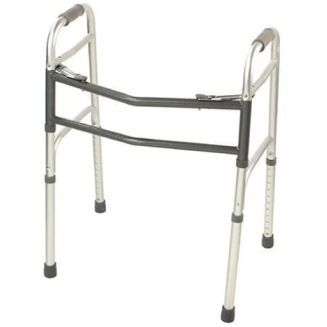 Deluxe Bariatric Foldable Walker1 Reviews
Deluxe Bariatric Foldable Walker1 Reviews- Contoured and textured handgrips
- Easy-to-use push-button mechanisms may be operated by fingers, palm or side of hand
- Each side operates independently
Weight Capacity 500 lbs. Min. Handle Height 31", 33.5" Max. Handle Height 41", 43.2" -
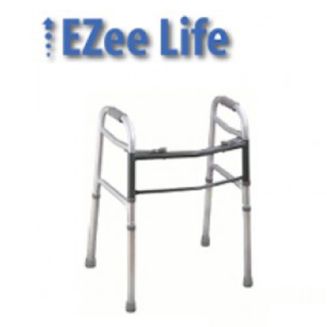 Ezee Life Single Button Adult Walker
Ezee Life Single Button Adult Walker- Single fold release button
- Very lightweight
Weight Capacity 300 lbs. Min. Handle Height 30" Max. Handle Height 36.8" -
Ezee Life Reciprocal Folding Walker
- Adult size
- Reciprocal function
Weight Capacity 300 lbs. Min. Handle Height 28" Max. Handle Height 35" -
Ezee Life Dual Button HD Walker1 Reviews
- Very lightweight
Weight Capacity 400 lbs. Min. Handle Height 32" Max. Handle Height 39" -
Ezee Life "T" Handle Cane
- 5" of adjustment range
- Aluminum construction
View itemCAD $35.00 -
Ezee Life Junior Lightweight Walker
- Very lightweight – 5.1 lbs
- Single or Dual release buttons
Weight Capacity 300 lbs. Min. Handle Height 25" Max. Handle Height 32" -
Deluxe Two Button Folding Walker
- Each side operates independently
- Easy push-button mechanisms may be operated by fingers, palms or side of hand
- Unique U-shaped frame design creates greater clearance
Weight Capacity 350 lbs. Min. Handle Height 32" Max. Handle Height 39" -
Out of stock
Ezee Life Dual Button Adult Walker- Dual release buttons
- Very lightweight
Weight Capacity 350 lbs. Min. Handle Height 31" Max. Handle Height 38"
Mobility Walkers
Who Would Need a Walker and Why?
People in need of mobility assistance may need more than just the assistance of a cane. A walker may be a good option for those interested in mobility assistive equipment. Those with poor upper arm strength upper arm strength, or who are unable to balance may prefer the security offered by a walker. Using an assistive device for walking allows individuals to walk further and accommodates a more active lifestyle. Their confidence level increases and they feel more independent. There is less danger of falling, posture may improve, and strength and endurance improve.
How to Use a Walker Properly
While the best way to learn how to use a walker is by following the advice of the mobility supply store or other vendor from whom it is purchased, there are a few general guidelines. Individuals should hold both handles firmly, but without causing tension in the hands. The arms bend at the elbows. Walk slowly, at a steady pace, and stay alert for obstacles that could cause a fall.
Types of Walkers
Rollators are wheeled walkers and provide many beneficial features, including increased mobility and independence. Most models accommodate individuals from zero to 500 pounds, while the Rollators themselves weigh between 10 to 30 pounds. Features like seats for resting, foldable units, and the availability of accessories like baskets and trays make walkers a good choice for a mobility aid.
Walkers are available with or without wheels, and can be accessorized to suit the needs and lifestyle of the individual users. Most manufacturers provide walkers that have a capacity of zero to 500 pounds and are adjustable for the person’s height.
Some types of specialty walkers are knee walkers and pediatric walkers. Knee walkers are designed for individuals recovering from leg injuries or surgery and provide the necessary assistive edge. Pediatric walkers accommodate the special needs of children. Other types of specialty walkers help patients rise from a sitting position easily or are fitted with weights to extend the benefit of physical therapy sessions and encourage muscle strength.
Walker Accessories
There are many innovative walker accessories available. These accessories extend the functionality of the walker and give users greater independence as they go about their daily routine. For instance, simply adding a hook to the walker to transport items like a purse or bags not only provides a convenient means of carrying these items, but also provides a safer means of conveyance. Trying to juggle a purse in one hand and balance a walker with the other is unwise. Individuals can shop for accessories like storage trays, wire baskets, mobility bags, or floor protectors for the walker legs.
Some Tips to Consider
Here are a few things to keep in mind when looking for a walker to meet your mobility needs:
- Is the walker adjustable? If the user is extremely short or tall, this feature could be crucial.
- Does it fold for easy transport? Wrestling an unwieldy walker in and out of a car trunk is not fun, especially on cold rainy days.
- Will the walker fit through the various doorways in the home? If not, can the doors be removed or otherwise retrofitted to accommodate the supportive device? If not, how will the individual be able to use the toilet with confidence and independence?
- Are the tips on the legs made of a non-skid substance? If the walker has wheels, are they non-skid?
Walkers are good choices for individuals with limited mobility and special functionality needs. Properly fitted and used, they offer these people the best and safest choice to regain their freedom and independence of motion.
